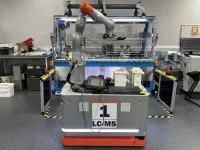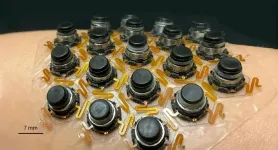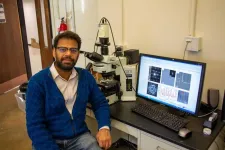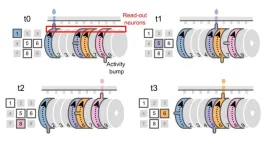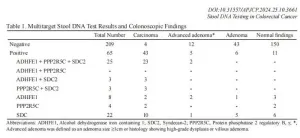(Press-News.org) Researchers at the University of Liverpool have developed AI-driven mobile robots that can carry out chemical synthesis research with axtraordinairy efficiency.
In a study publishing in the journal Nature, researchers show how mobile robots that use AI logic to make decisions were able to perform exploratory chemistry research tasks to the same level as humans, but much faster.
The 1.75-meter-tall mobile robots were designed by the Liverpool team to tackle three primary problems in exploratory chemistry: performing the reactions, analysing the products, and deciding what to do next based on the data.
The two robots performed these tasks in a cooperative manner as they addressed problems in three different areas of chemical synthesis—structural diversification chemistry (relevant to drug discovery), supramolecular host-guest chemistry, and photochemical synthesis.
The results found that with the AI function the mobile robots made the same or similar decisions as a human researcher but these decisions were made on a far quicker timescale than a human, which could take hours.
Professor Andrew Cooper from the University of Liverpool’s Department of Chemistry and Materials Innovation Factory, who led the project explained:
“Chemical synthesis research is time consuming and expensive, both in the physical experiments and the decisions about what experiments to do next so using intelligent robots provides a way to accelerate this process.
“When people think about robots and chemistry automation, they tend to think about mixing solutions, heating reactions, and so forth. That’s part of it, but the decision making can be at least as time consuming. This is particularly true for exploratory chemistry, where you’re not sure of the outcome. It involves subtle, contextual decisions about whether something is interesting or not, based on multiple datasets. It’s a time-consuming task for research chemists but a tough problem for AI.”
Decision-making is a key problem in exploratory chemistry. For example, a researcher might run several trial reactions and then decide to scale up only the ones that give good reaction yields, or interesting products. This is hard for AI to do as the question of whether something is ‘interesting’ and worth pursuing can have multiple contexts, such as novelty of the reaction product, or the cost and complexity of the synthetic route.
Dr Sriram Vijayakrishnan, a former University of Liverpool PhD student and the Postdoctoral Researcher with the Department of Chemistry who led the synthesis work, explained: “When I did my PhD, I did many of the chemical reactions by hand. Often, collecting and figuring out the analytical data took just as long as setting up the experiments. This data analysis problem becomes even more severe when you start to automate the chemistry. You can end up drowning in data.”
“We tackled this here by building an AI logic for the robots. This processes analytical datasets to make an autonomous decision—for example, whether to proceed to the next step in the reaction. This decision is basically instantaneous, so if the robot does the analysis at 3:00 am, then it will have decided by 3:01 am which reactions to progress. By contrast, it might take a chemist hours to go through the same datasets.”
Professor Cooper added: “The robots have less contextual breadth than a trained researcher so in its current form, it won’t have a “Eureka!” moment. But for the tasks that we gave it here, the AI logic made more or less the same decisions as a synthetic chemist across these three different chemistry problems, and it makes these decisions in the blink of an eye. There is also huge scope to expand the contextual understanding of the AI, for example by using large language models to link it directly to relevant scientific literature.”
In the future, the Liverpool team wants to use this technology to discover chemical reactions that are relevant to pharmaceutical drug synthesis, as well as new materials for applications such as carbon dioxide capture.
Two mobile robots were used in this study, but there is no limit to the size of the robot teams that could be used. Hence, this approach could scale to the largest industrial laboratories.
A video showing two mobile robots working together is here.
This new research builds on the world’s first ‘mobile robotic chemist’, reported by Professor Cooper’s team in 2020 (Nature, 2020, 583, 237), which performed almost 700 catalysis experiments over 8 days, working 24/7.
The paper ‘Autonomous mobile robots for exploratory synthetic chemistry’ is publishing in the journal Nature.
The project was funded by the Leverhulme Trust, the European Research Council, and the Engineering and Physical Sciences Research Council.
Professor Andrew Cooper FRS is the Co-Director of AI for Chemistry (AIchemy), the flagship EPSRC UK Hub for AI in Chemistry.
Professor Cooper is also Academic Director of the Materials Innovation Factory, an £81 million facility dedicated to the research and development of advanced materials.
Professor Cooper is also Director of the Leverhulme Research Centre for Functional Materials Design, an interdisciplinary centre which is transforming the discovery of new materials using digital technologies.
END
A Northwestern University-led team of engineers has developed a new type of wearable device that stimulates skin to deliver various complex sensations.
The thin, flexible device gently adheres to the skin, providing more realistic and immersive sensory experiences. Although the new device obviously lends itself to gaming and virtual reality (VR), the researchers also envision applications in healthcare. For example, the device could help people with visual impairments “feel” their surroundings or give feedback to people with prosthetic limbs.
The ...
About The Study: In this randomized clinical trial assessing simultaneous vs sequential administration of mRNA COVID-19 and inactivated influenza vaccines, reactogenicity was comparable in both groups. These findings support the option of simultaneous administration of these vaccines.
Corresponding Author: To contact the corresponding author, Emmanuel B. Walter, MD, MPH, email chip.walter@duke.edu.
To access the embargoed study: Visit our For The Media website at this link https://media.jamanetwork.com/
(doi:10.1001/jamanetworkopen.2024.43166)
Editor’s Note: Please see the article for additional information, including other ...
About The Study: This retrospective cohort study with an extended follow-up period found associations between COVID-19 and the long-term risk of various autoimmune and autoinflammatory connective tissue disorders. Long-term monitoring and care of patients is crucial after COVID-19, considering demographic factors, disease severity, and vaccination status, to mitigate these risks.
Corresponding Author: To contact the corresponding author, Solam Lee, MD, PhD, email solam@yonsei.ac.kr.
To access the embargoed study: Visit our For The Media website ...
Mount Sinai researchers have discovered for the first time a neural mechanism for memory integration that stretches across both time and personal experience. These findings, reported in Nature, demonstrate how memories stored in neural ensembles in the brain are constantly being updated and reorganized with salient information, and represent an important step in deciphering how our memories stay current with the most recently available information. This discovery could have important implications for better understanding adaptive memory processes ...
The atoms of amorphous solids like glass have no ordered structure; they arrange themselves randomly, like scattered grains of sand on a beach. Normally, making materials amorphous — a process known as amorphization — requires considerable amounts of energy. The most common technique is the melt-quench process, which involves heating a material until it liquifies, then rapidly cooling it so the atoms don’t have time to order themselves in a crystal lattice.
Now, researchers ...
Ghent, 7 November 2024 – Scientists have uncovered how certain E. coli bacteria in the gut promote colon cancer by binding to intestinal cells and releasing a DNA-damaging toxin. The study, published in Nature, sheds light on a new approach to potentially reduce cancer risk. The study was performed by the teams of Prof. Lars Vereecke (VIB-UGent Center for Inflammation Research) and Prof. Han Remaut (VIB-VUB Center for Structural Biology).
Bacteria and colon cancer
Colon cancer ranks as the third most prevalent and deadliest type of cancer. Alarmingly, its incidence is rising, particularly ...
Neuroscientists have discovered brain cells that form multiple coordinate systems to tell us “where we are” in a sequence of behaviours. These cells can play out different sequences of actions, just like a music box can be configured to play different sequences of tones. The findings help us understand the algorithms used by the brain to flexibly generate complex behaviours, such as planning and reasoning, and might be useful in understanding how such processes go wrong in psychiatric ...
Some patients being treated with immune checkpoint inhibitors, a type of cancer immunotherapy, develop a dangerous form of heart inflammation called myocarditis. Researchers led by physicians and scientists at the Broad Institute of MIT and Harvard and Massachusetts General Hospital (MGH), a founding member of the Mass General Brigham healthcare system, have now uncovered the immune basis of this inflammation. The team identified changes in specific types of immune and stromal cells in the heart that underlie myocarditis and pinpointed factors in the blood that may indicate ...
Families purchased more school lunches and breakfasts the year after the federal government toughened nutritional standards for school meals. A new University of California, Davis, study suggests that families turned to school lunches after the Obama administration initiative was in effect to save time and money and take advantage of more nutritious options.
Researchers looked at the purchasing habits of nearly 8,000 U.S. households over two years — one year before and after the change in standards. The results have important implications for policymakers and researchers, but also food manufacturers and retailers, researchers said.
The study, ...
A recent prospective cross-sectional study in Thailand demonstrates that multitarget stool DNA testing is highly sensitive and specific for detecting colorectal cancer (CRC) among Thai individuals. Researchers believe that this testing method could serve as a viable non-invasive alternative to colonoscopy, especially in settings where colonoscopy is less accessible or less accepted by patients.
This study was conducted by BGI Genomics in 2023, in collaboration with Professor Varut Lohsiriwat’s team from the Faculty of Medicine, Siriraj Hospital, Mahidol University, Thailand. ...
